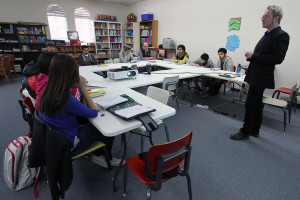
Two tenure-track assistant professor positions were filled in the Prothro-Yeager College of Humanities and Social Sciences this fall. Tench Coxe, Intensive English Language Institute program coordinator since Fall 2012, will fill the humanities position opened by the retirement of Lynn Hoggard, and Lucy Schultz, doctoral candidate at the University of Oregon, will serve as an assistant professor of philosophy, doubling the size of the philosophy department.
Both job searches started with a list of nearly 200 applicants for each position which were narrowed down to two candidates who were invited to the campus for interviews and evaluations.
Coxe, who has a background in teaching film, said in addition to teaching two ancient world humanities courses, he will also teach a rhetoric and composition survey and Introduction to World Film.
“They decided to include, as a component of the position, someone with an interest in teaching film,” Coxe said. “One of the job requirements was the ability to teach composition, which I had experience in.”
Coxe said he and the other humanities candidate were required to demonstrate their ability to grade composition assignments as part of the hiring process.
“We were given three anonymous final exam papers and a rubric for scoring it, and we were asked to assign grades to the three exams,” Coxe said. “It was an interesting exercise. It’s a good way to get into a discussion about what good writing constitutes and how to differentiate between a competent, capable writer and a sophisticated writer.”
While Schultz will have just completed her doctorate when she starts in the fall, Coxe has been teaching at the college level for more than 10 years and said he is looking forward to returning to a full-time professorship.
“I’ve been giving scholarly papers at conferences for the year-and-a-half that I’ve been here so I’ve kept my hand in academic work but to be back on the day-to-day level I think is going to be challenging and rewarding,” Coxe said. “I think I will feel at ease and natural doing it but of course the scope of preparation ahead of me is daunting so the challenging part will be more about getting prepared for these courses.”
Nathan Jun, philosophy coordinator and assistant professor, said he pushed for hiring another philosophy professor, enabling the program to offer eight classes in the fall instead of the usual four.
“This is something that I’ve been fighting for for five years, pretty much since I’ve been here, and it just finally happened,” Jun said. “Like so many other things that happen at this university, it was just happenstance. The stars just kind of aligned in a fortuitous way and an opportunity opened up.”
Jun said hiring Schultz will diversify the philosophy courses at MSU, but it will also help ease the immense burden he has been under as a one-man philosophy department.
“It’s been extremely difficult. I teach two lower level courses every semester, Ethics and Primary Concerns of Philosophy, and those are routinely anywhere from 30 to 40 students and the two upper level classes would be anywhere from 20 to 25. So pretty consistently I was teaching over 100 students every semester,” Jun said. “Because my classes are so writing intensive, the grading is just outrageous. If there weren’t as much of a demand for philosophy as there has been, my job would probably be a lot easier, but it’s just reached a point where it’s unsustainable with just one person.”
Although Jun said the stars had to align to hire Schultz, he also said there has been widespread support for expanding the university’s philosophy courses.
“There’s a consensus that it was long overdue. There’s a conspicuous demand for more philosophy courses; there are a lot of students who are interested in minoring in philosophy who would major in philosophy if we had a major,” Jun said.
Jun said doubling the amount of courses from four to eight will also allow him to reduce the class sizes.
“We’re going to cap them at 12 students, which is ideal for a philosophy class. The more students that there are the harder it is to facilitate discussion, which is paramount in philosophy,” Jun said. “I found that the best classes are always the smallest classes because people are either more willing to talk or they’re less able to get away with not talking.”
















